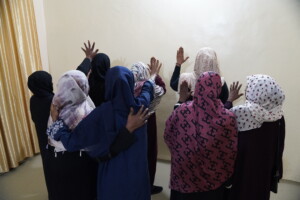Interview with Sudan’s first professional woman guitarist: ‘the Ministry of Culture neglects Sudanese art’
In an interview for Radio Dabanga’s Inspirational Women series, musician Zakia Abul Gassim Abu Bakr talked about her outstanding career, her upbringing, and her opinion on the government. She criticised government agencies for neglecting Sudanese art and failing to support its artists on their journey to reach international audiences.
 Zakia Abul Gassim Abu Bakr with her guitar last year (Anonymous Mono Photography)
Zakia Abul Gassim Abu Bakr with her guitar last year (Anonymous Mono Photography)
In an interview for Radio Dabanga’s Inspirational Women series, musician Zakia Abul Gassim Abu Bakr talked about her outstanding career, her upbringing, and her opinion on the government. She criticised government agencies for neglecting Sudanese art and failing to support its artists on their journey to reach international audiences.
Zakia Abul Gassim Abu Bakr is the first known woman guitarist in Sudan and the founder of the all-women’s band Sawa Sawa. She is also famous for her role as guitarist in the jazz band of her husband Sharhabil Ahmed, also known as ‘the king of Sudanese jazz’.
She has received honours from inside and outside Sudan.
Zakia recently announced the release of the first album of her new band Sawa Sawa, consisting of six women, which will soon see the light in the form of six songs written and composed by her.
When talking about her revolutionary career, Zakia explains that “it was the Sudanese dress that attracted them the most… I feel that the audiences were amazed and happy to see a woman in a Sudanese jazz band”.
“The lady with the dress plays the guitar; a unique and unfamiliar scene in my time” Zakia explains. It was a revolutionary path she loved and followed in confident steps.
She also had a great musician behind her, a man who supported and pushed her through all stages of her life. Her husband Sharhabil Ahmed was the first Sudanese jazz artist. In their artistic marriage, she learned to play the oud (type of lute) and then the guitar, with which she began her artistic journey.
‘The lady with the dress plays the guitar; a unique and unfamiliar scene in my time’

Early life
Zakia was born in the neighbourhood of Abbasiya, Omdurman. A place known for its art, literature, and cultural life. Zakia did not complete her secondary education due to family circumstances but she worked as a teacher at the Fella Gerges School for four years.
From there, she began to refine her abilities as an educated woman who is useful to the community and she took a number of Sudanese Red Crescent courses in Khartoum, using her newly developed skills during visits to nearby villages.
“Then, I joined literacy courses in the Municipal Council for two years, during which I learned the culture and wisdom of the professors Fatima Madani, the wife of the painter Mahmoud Abu Bakr”, the musician explains.
Her life path demonstrates the family’s respect for women, their right to education, work, and independence. Zakia grew up with her mother Fatima Abu Bakr in the house of her mother’s brother Ahmed Ansari. Her mother joined the illiteracy eradication class system, which encouraged women to learn.
Entertainment had an important space in her uncle Ahmed Ansari’s life, especially cinema. Going for walks in Khartoum parks was another thing the family used to do. “Uncle Ahmed was enlightened, he cared about cinema and the green spaces in Khartoum; he used to give us space to challenge ourselves and our personalities”, Zakia explains, “it gave us freedom on the condition that we respect ourselves and others”.
Love for music
Her love for music since her early childhood drove her to learn to play an instrument.
‘For women, formal education in music and arts was a narrow path’
The self-thought musician explained that, for women, formal education in music and arts was a narrow path. She shyly started learning how to play the flute and began to sing her first musical pieces.
Perhaps that spirit of love for art and music was what brought her together with her ‘companion on the journey of art and life’; the jazz artist Sharhabil Ahmed. They married in 1965 and he was the best supporter of her artistic journey, which started from the marital home where the musical instruments were at her fingertips.
‘Sharhabil was a supporter of women. He told me ‘I want you in the band’
She played the oud to practice and then, when she mastered the guitar, her husband, asked her to join his band. “Sharhabil was a supporter of women,” Zakia said. “He told me ‘I want you in the band’, so I submitted an application to join and it was accepted and my first income from the concert was three pounds.”
Her presence in the sixties as a woman guitarist in a band and her traditional Sudanese dress must have astonished many in Sudanese society. “I used to see women acting in the cinemas and I was happy with them, so my feeling about it all was normal despite people’s view of the strange scene when I was standing among the men in the band”. “With the members of the band, Kamel Hassan, Ahmed Daoud, and Mahdi Ali Nour, we all had a family relationship, which gave me the feeling that I was among my brothers,” Zakia said.

Between Cairo and international cities
The eighties of the last century brought a new transitionary phase.
Zakia and Sharhabil moved to Cairo for their children’s education. Sherif, Ahmed, Mohamed, Shehab, Shahira, Nahed, and Noha all grew up as innate artists and musicians.
The period of residence in Cairo was an inspiring period and Zakia’s poetic talents emerged more clearly as she continued to produce more poetry, which she had started early in the sixties. She also composed 15 songs. Recently, she announced a collection of poetry that will see the light soon.
At that time, the couple held performances at the Cairo Opera House for six years during their summer festival and at the Roman theatre in Alexandria, both of which were very popular. Their international activities continued, bringing them to festivals in Asmara, London, Holland, Paris, and Berlin.
‘I felt that people were impressed and happy to see a woman in a Sudanese jazz band’
Radio Dabanga spoke with Zakia about her impressions abroad as a guitarist in the band. “I felt that people were impressed and happy to see a woman in a Sudanese jazz band”, she explained.
Ministry of Culture
It was mostly individual efforts and invitations that allowed audiences to hear the sound of Sudanese music in cities around the world.
‘The Ministry of Culture responsible for this is not ready to help or develop Sudan’s artistic scene’
Zakia explains: “Sudanese art has not reached global recognition because no one has had the courage to push it into the world”. “The Ministry of Culture responsible for this is not ready to help or develop Sudan’s artistic scene.”
The guitarist, poet, and composer complained that Sudanese art did not reach international audiences because it “kept revolving in the same vicious circle”. Zakia directly blamed the Sudanese Ministry of Culture, which “has the duty to work on this international development”.
Zakia explained that “Sudan is rich in diversity and each region is distinguished by its own art and rhythm with its own features of melody, performance, and words, which must be preserved and supported”.
In the past, until the start of the Omar Al Bashir regime in the late 1980s, the government supported cultural festivals and international travel. “The Ministry of Culture was not stingy in carrying folk and artistic groups on a full plane in which all races were represented, but now it is not interested in developing arts and does not recognise or evaluate the artistic wealth of its country”, she said.
In an interview with The Quietus last year, her husband Sharhabil explained that during the Al Bashir regime, “they were very hard on dealing with musicians”. During concerts, “the police could arrive at any time with guns and order an artist to step down from the stage. Sometimes they would take our instruments and sound systems or shoot above the crowd with real bullets to try and stop us by force. It felt like the lives of artists were in great danger.”
‘Musicians are often among the least appreciated and most maligned, especially so when their music has a political message, no matter how subtle’
“There is something about music that brings out the best in people. It touches their hearts and stirs their innermost feelings,” he once said in an interview with Al Ahram Weekly in 2004. “Yet musicians are often among the least appreciated and most maligned, especially so when their music has a political message, no matter how subtle.”
Sawa Sawa
Every stage in the talented musician’s career carries a different taste, and it is continuing to grow. In the past decade, the band Sawa Sawa began forming as a purely women’s group, including bassist Islam Elbeiti, and performed at least 6 shows in Khartoum.
In an interview with Yamaha in 2018, Islam Elbeiti said that “our band leader, the legendary female Sudanese musician Zakia Abul Gassim, is still going strong in her 80s”. “How lucky I am to have the chance to regularly perform with such an awe-inspiring figure so early in my professional career”.
Zakia is currently working to release the band’s first album for which she composed all songs. The album will feature three purely instrumental songs and three songs with sung poetry: Emily and Manay, Wad Omi Nour Aini, and Helmet Bey.
The album preface includes a poem of peace and unity between Sudan’s diverse tribes (translated from Arabic):
With love for all our different features
Our blood is one, equal and unified, and flows in the same veins
We sleep and wake up with the word peace, we always say it
Sawa Sawa Sawa (together together together)
Our revolution is made of peace and love, we want to keep this
We will not take a step back, Sudan is big enough for everyone











 and then
and then